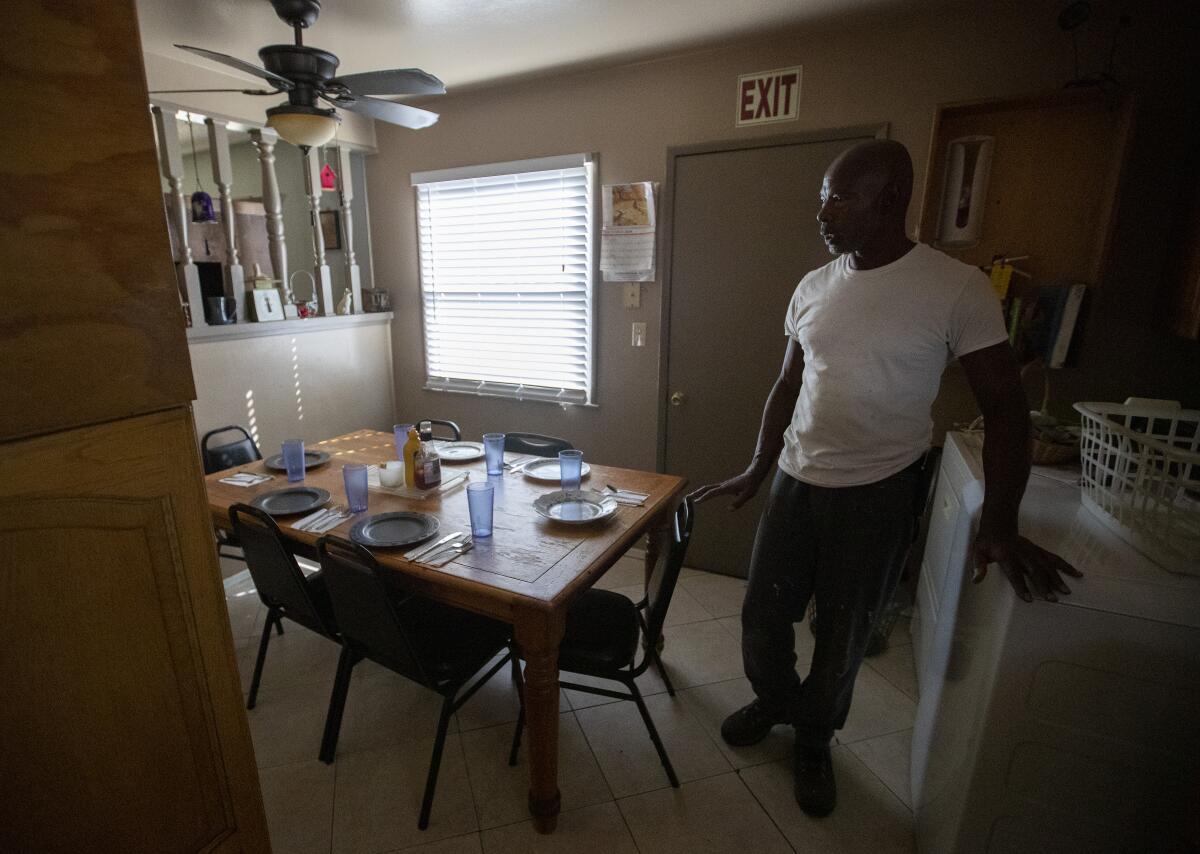$500 million from Newsom could keep L.A.’s most vulnerable from becoming homeless

In an effort to keep thousands of people with mental illness from becoming homeless, a coalition of L.A. County officials and homeless advocates is urging Gov. Gavin Newsom to put $500 million into his January budget proposal to shore up financially struggling board and care homes.
The money, according to a fact sheet submitted by the California County Behavioral Health Directors Assn. and the Steinberg Institute, is needed to preserve potentially hundreds of homes that are on the brink of closure because the state reimbursement rate is too low to cover their rising costs.
A recent survey by the California Community Care Licensing Division found that 39 board and care homes closed in Los Angeles County over a three-year period, leaving only 159 in operation.
Generally located in small apartment buildings or single-family homes, board and care homes provide shelter, three meals a day, housekeeping and medication management to residents. Those serving indigent residents — the majority — are reimbursed $1,058 a month by the state, or about $35 a day, and cannot charge more than that.
Los Angeles County and others across California have been using local funds to augment the state rate. L.A. County provides additional funds for about 2,000 board and care beds.
The one-time expenditure of $500 million, the coalition says, would buy time for the state to enact a new funding structure for reimbursement. Doing so would put threatened board and care homes on a more permanent financial footing and support more services for their residents, advocates and county officials said.
“The loss of a board and care facility permanently reduces the state’s and counties’ capacity to house vulnerable populations of persons who are aged, disabled or have a mental illness,” the joint statement to the governor said. “Without these facilities, the growing aging population and others who are homeless or at-risk for homelessness will likely find themselves with no other options but to live on the streets or in more expensive levels of care such as nursing homes and hospitals.”
Newsom’s office did not respond to a request for comment.
Board and care homes are licensed by the state under the categories of adult residential facilities and residential facilities for the elderly. But the number of them that serve mentally ill residents is unknown because those licenses include other types of homes.
Many operators say they are in the red and have no margin to maintain their facilities, which has led to more frequent citations by state inspectors.
The coalition based its $500-million request on a rough calculation of what it would cost to raise the state’s monthly reimbursement to about $2,600 for 60% of the 45,000 California residents who receive nonmedical out-of-home care payments.
In a separate letter to Newsom, the Steinberg Institute, a homeless advocacy nonprofit founded by Sacramento Mayor Darrell Steinberg, proposed a new funding structure based on the state’s homes for people with developmental disabilities. Those homes receive funding based on each resident’s needs, with a cap of about $8,000 a month.
Two other statewide organizations also signaled their support for the budget request.
The California State Assn. of Counties “is supportive of the proposal seeking state assistance to stem the loss of board and care homes in our communities,” Executive Director Graham Knaus said in a statement. “We cannot lose this critical piece of the housing continuum on which counties depend for providing shelter to a spectrum of vulnerable people. This is one of a number of critical proposals needed to address homelessness.”
The County Welfare Directors Assn. of California has not taken an official position on the request for one-time funding, but is generally supportive, “as the loss of board and care homes is an issue our members are seeing locally,” Executive Director Cathy Senderling-McDonald said.
More to Read
Sign up for Essential California
The most important California stories and recommendations in your inbox every morning.
You may occasionally receive promotional content from the Los Angeles Times.











